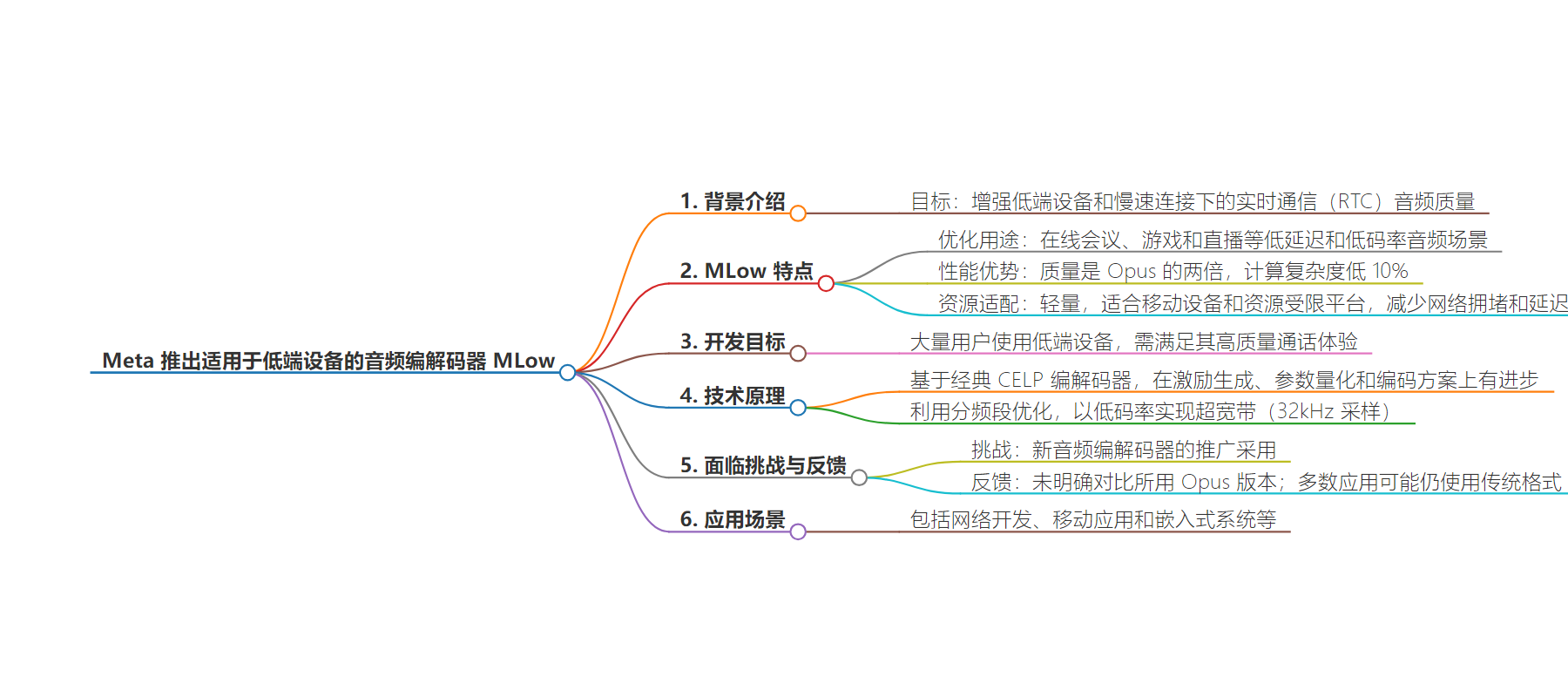包阅导读总结
1.
– `Meta`、`MLow 音频编解码器`、`低带宽`、`低计算复杂度`、`高质量音频`
2.
Meta 推出针对低端设备和慢速连接的音频编解码器 MLow,旨在提升实时通信质量,在低带宽下能高效传输高质量音频,计算复杂度低,适用于多种场景。
3.
– Meta 推出 MLow 音频编解码器
– 目的:提升低端设备和慢速连接下的实时通信(RTC)音频质量
– 优势:低延迟、低码率,音频质量是 Opus 的两倍,计算复杂度降低 10%
– 设计特点:轻量,适合资源受限平台,减少网络拥塞和延迟
– 技术原理:基于经典 CELP 编解码器概念,有激励生成等方面的改进
– 应用场景:包括网页开发、移动应用和嵌入式系统等
– 面临的挑战与反馈:采用面临挑战,用户对与 Opus 对比的版本有疑问,有人认为新应用有限
思维导图:
文章来源:infoq.com
作者:Renato Losio
发布时间:2024/8/10 0:00
语言:英文
总字数:481字
预计阅读时间:2分钟
评分:85分
标签:音频编解码器,Meta,低端设备,实时通信,低延迟
以下为原文内容
本内容来源于用户推荐转载,旨在分享知识与观点,如有侵权请联系删除 联系邮箱 media@ilingban.com
Meta has recently announced the Meta Low Bitrate (MLow) audio codec, aimed at enhancing real-time communication (RTC) on low-end devices and slow-speed connections. This new codec is designed to deliver efficient, high-quality audio streaming, even under low bandwidth conditions.
MLow is optimized for use cases where low-latency and low-bitrate audio are required, such as online conferencing, gaming, and live streaming. According to the developers, the new codec achieves twice the quality of Opus (POLQA MOS 1.89 vs 3.9 at 6 kbps WB) while maintaining 10 percent lower computational complexity.
MLow is designed to be lightweight, making it suitable for mobile devices and other resource-constrained platforms, reducing network congestion and latency in real-time scenarios. Jatin Kumar, Bikash Agarwalla, Sriram Srinivasan, King Wei Hor, and Tim Wong explain the goal:
A significant number of our users still use low-end devices. For example, more than 20 percent of our calls are made on ARMv7 devices, and 10’s of millions of daily calls on WhatsApp are on 10-year-old-plus devices. Given the readily available codec choices and our commitment to ensure that all users – regardless of what device they’re on – have a quality calling experience, we clearly need a codec with very low-compute requirements that still delivers high-quality audio at these lowest bitrates.
/filters:no_upscale()/news/2024/08/meta-mlow-audio-codec/en/resources/1MLow-image-3(1)-1722500894071.jpg)
Source: Meta blog
Increasing complexity or bitrate usually improves audio quality, but the goal of new codecs is to achieve higher quality while balancing complexity and bitrate. This is accomplished by leveraging deep knowledge about the nature of audio signals and utilizing psychoacoustics.
Adoption is another challenge: the last widely known, high-quality open-source codec was Opus, released in 2012. Kumar, Agarwalla, Srinivasan, Hor and Wong add:
MLow builds on the concepts of a classic CELP (Code Excited Linear Prediction) codec with advancements around excitation generation, parameter quantization, and coding schemes. (…) With these split-band optimizations, we are able to encode the high band using very few bits, which lets MLow deliver SuperWideBand (32kHz sampling) using a much lower bitrate.
Srinivasan, Kumar, and Agarwalla recently presented a session on how Meta manages natural real-time audio communication at scale across WhatsApp, Instagram, and Messenger, addressing the diversity of devices and network conditions. In a popular Reddit thread, user BlueSwordM writes:
This looks like a new great addition to the ever-growing library of low bitrate audio codecs. My only issue with this introductory article is that they don’t seem to specify which Opus version was used at these low bitrates: we don’t know if Opus 1.4 or Opus 1.5 was used. Considering the improvements Opus 1.5 brought to the table at these low bitrates with new ML coding tools, it is slightly misleading.
User ggRavingGamer highlights the technical achievement but warns:
It doesn’t matter, most podcasts, most anything will still use MP3 and AAC in 20 years.
The new codec can be used in different applications, including web development, mobile apps, and embedded systems.
